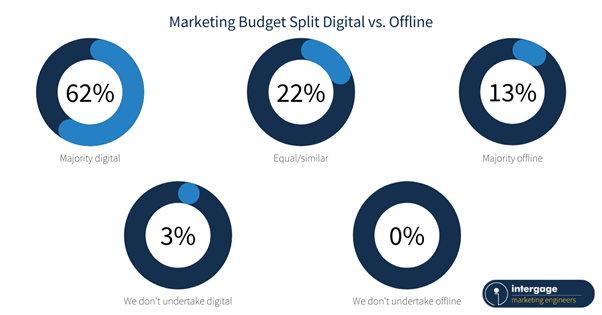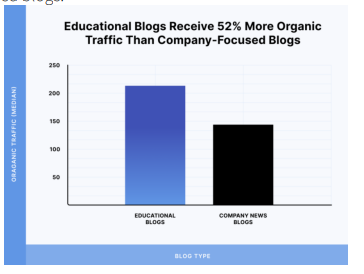The Complete Guide to Marketing For Manufacturers
Marketing is a crucial part of any ambitious business. However, it is particularly important for those in crowded marketplaces with many companies offering the same or similar products. Manufacturing certainly comes under that umbrella. If your manufacturing business wants to achieve any of the following, you're going to need to invest in marketing:
- better qualified leads
- increased market share
- improved lead to sale conversion rates
- increased revenue.
In this article, we will give you a taste of what it takes to be successful at marketing in the manufacturing industry, which areas of marketing you should focus on and provide you with free resources to help you along the way!
Let's get started!
The state of marketing in manufacturing
Marketing has become increasingly important to the manufacturing sector with 63% of manufacturers considering marketing as a ‘high priority’. Moreover, there has been a 20% increase in the number of manufacturing companies that have a documented marketing strategy, according to the CMI report.

Digital marketing in particular has seen a rise in popularity with:
- 62% of manufacturers investing most of their marketing budget in digital marketing activity
- a further 22% splitting their budget between digital and more traditional marketing methods.
However, manufacturers seem reluctant to invest in strategies involving marketing automation or account-based marketing. This is perhaps due to a lack of understanding of these initiatives – or a lack of resources. Either way, there is certainly room for manufacturers to gain a competitive advantage by investing in such initiatives.
At the other end of the spectrum, social media, content creation and e-mail marketing appear to be the most popular with manufacturing businesses. While these are tried-and-tested marketing activities, manufacturers will be up against high levels of competition in these areas. A Fried Egg Marketing strategy can help manufacturers stand out by ensuring they focus their efforts on the most valuable prospects rather than getting lost in the noise of broad, unfocused campaigns.
You can read more on the state of manufacturing here.
Top 10 marketing tips for manufacturers
Over the last 20 years of working with manufacturers on their digital marketing, we have come to learn some important lessons. Our experience and data collected in The Marketing In Manufacturing Report indicates that there are 10 marketing tips that every manufacturing business should live by.
They are:
- Know your audience – you need to know your audience inside-out. What their challenges are, how they work, what triggers them to make a purchase – the list goes on. That means you need to have detailed marketing personas. These should take into consideration how much buying power the person has, who they are influenced by and what stage of the buyer’s journey they are in. Fried Egg Marketing is all about knowing your audience, ensuring you don’t waste time marketing to egg whites.
- Create content pillars – these days, just creating content isn’t enough to get you found in search engines. You need to create the right content and structure it in the right way. That often means creating content pillars. Content pillars allow you to create structured clusters of content which make it easier for both users and search engines to find and read your content. You can find out more about what a content pillar looks like here.
- Get social – there’s no use creating lots of content if you aren’t going to share it with those who already follow your company on social media. 83% of manufacturing businesses have used social media in the last 12 months (The Marketing In Manufacturing Report) so it’s safe to say it’s popular with industrial businesses. However, are manufacturers using it effectively? And which channels are most successful?
- Improve your email marketing – this can be the key to success if you do it right. With the average person receiving 126 emails per day, you need to stand out from the crowd. The right segmentation and messaging you can drive outstanding results from email marketing. And most of the time, this can be achieved without generating a single new lead!
- Use marketing automation – you can take your email marketing one step further with marketing automation by sending effective messages at precisely the right time on autopilot. Marketing automation will also give you the tools you need to make your sales team more effective and your marketing team more efficient. You can find out more about the benefits of marketing automation for manufacturers here.
- Save time with chatbots – similarly to marketing automation, chatbots can make your sales and marketing teams more effective while also delivering the content your prospects need when they need it.
- Make regular website improvements – keeping your website regularly updated is vital. That doesn’t mean uploading articles on your latest awards and which stands you’ll be on at upcoming events. It means keeping your messaging fresh, reviewing your user journeys regularly and having a steady stream of useful thought leadership content.
- Follow SEO best practices – SEO was voted the third most successful marketing activity in last year’s Marketing In Manufacturing Report. The search landscape can be particularly competitive for manufacturers who often operate in niche markets. There is likely to be a finite number of people searching for your products and services so owning as much of that space as possible is crucial. That means following SEO best practices is a must.
- Invest wisely with paid advertising – paid advertising can be a great way to drive qualified leads to your site (but also a way to waste significant amounts of money). It’s crucial that manufacturers invest in the right key terms at the right time to drive ROI. Otherwise, you could be throwing money into a black hole. When reviewing one manufacturer’s paid search account, we found that 52% of their yearly spend was being wasted on sponsoring phrases that were not converting. That equated to close to £21,000 wasted in just one year!
- Report with Google Analytics – Google Analytics is the best insight you are going to get into the quality of traffic you’re driving to your website and how that traffic is moving through your website. It’s a free tool and there’s no excuse for manufacturers not to use it. Without looking at this data and reporting on KPIs each month, you are going to find it incredibly difficult to know what’s working, where money can be saved and how your website can be improved to increase ROI.
Learn about each tip in more detail here!
Inbound marketing for manufacturers
The internet has changed the way people buy forever. Today, buyers are on average, 60% of the way through their buying journey before wanting to engage with a salesperson. On top of that, manufacturers are often dealing with complex buying teams and long sales cycles. Inbound marketing allows each person within that buying process to engage with you on their terms.
No annoying adverts. No cold sales calls. Just relevant, contextual content as and when they need it.
The inbound methodology is designed to:
- attract relevant visitors to your website
- convert visitors into leads
- nurture and close those leads into customers
- continue to engage and delight those customers
- transform them into promoters!
It HELPs buyers through their decision-making process instead of trying to SELL to them.
In this blog we discuss the seven steps to perfect inbound marketing for manufacturers including:
- Identify your target audience
- Develop campaign messaging and a content offer
- Develop surrounding content
- Promote content through advertising
- Create content pillars
- Capture data and nurture leads
- Measure success.
Building personas for manufacturing businesses
Personas are semi-fictional representations of your ideal customer. Personas should act as a guide so you know how to approach the target market of each marketing campaign. They should give you:
- an outline of who you’re targeting
- what your audience’s challenges are
- what your audience needs from you
- what makes your personas buy
- which channels your audience is present on.
With 80% of manufacturing businesses planning on investing in content marketing over the next 12 months, marketing persons are crucial for the industry (The Marketing In Manufacturing Report). Marketing personas are key for any manufacturing marketing and yet so many manufacturers get them wrong – considering them a ‘box ticking exercise’ (if at all).
This blog outlines four key reasons why marketing personas are so crucial to manufacturing businesses and how they should be developed. Contrary to popular belief, marketing personas are not just down to the marketing team to develop. They require the knowledge of your service, marketing, sales and key leadership team to be successful. Getting the perspective of your key teams means your personas will be as detailed as possible. After all, you should know your personas inside-out and they should be used at every stage of your marketing campaigns.
To give you an idea of what a buyer persona might look like, we have included an extract from one of our own below
 So, why are buyer personas so important for manufacturing businesses?
So, why are buyer personas so important for manufacturing businesses?
- Buyer personas help generate leads. Marketing is all about attracting the right audience and getting that audience to take the actions you want it to take – that is lead generation in a nutshell. Buyer personas help you to develop an in-depth understanding of who the right audience is and what makes them tick. Without this information you have very little hope of guiding people to take a required action. Using a Fried Egg Marketing, manufacturers can ensure their personas focus on the 'yolk rather than wasting effort on broader, less engaged audiences
- Buyer personas help to align marketing, sales and service departments. It’s common in manufacturing businesses for there to be a misalignment between sales, marketing and service departments. The process of developing marketing personas allows these three groups to come together and share experiences to build up a bigger picture of what your audience looks like. You’ll often find that your sales team have a very different perception of leads and customers to your marketing team. Both are equally valid and provide value. The persona development process will bring those perceptions together to create a full understanding of your audience. Fried Egg Marketing takes this a step further by ensuring alignment is centred around the Ideal Client Profile (ICP), so all teams are working towards the same high-value prospects.
- Buyer personas improve segmentation – understanding your audience in this level of detail will allow you to segment your audience into groups with similar interests, triggers and needs. The beauty of this is that you can create pertinent sales messaging for each group in order to generate better results. With a Fried Egg Marketing® approach, segmentation becomes even more precise, helping manufacturers focus their marketing spend on the yolk.
How to develop a marketing strategy for a manufacturing business
Developing a marketing strategy might seem like a simple step that every manufacturing business takes. But you’d be surprised! 50% of SMEs currently don’t have a marketing strategy. Most of those that do (86%) spend less than one hour per month discussing their strategy (OnStrategy).
For manufacturers, it can often be difficult to stand out, meaning the battle with competitors is painful. Having a marketing strategy allows you to understand the landscape, develop a competitive differentiation and focus on your goals. It should be a document that you review every month and share with your wider team to ensure everyone is on the same page. Your marketing strategy should also outline who is responsible for completing specific tasks.
A manufacturing marketing strategy should have six key sections:
- Current situation – this should provide a summary of where you are now and the current situation your business is in.
- Business objectives – here, you should outline what your business objectives are and where you want the business to be. Remember, these objectives should be SMART.
- Challenges – identify the challenges you will be up against to meet your objectives. You should list internal challenges, challenges with your prospects and customers, and wider challenges such as the effects that COVID-19 and Brexit have on your business.
- Policies – create a policy for each of those challenges. These policies should act as a roadmap for how you will overcome each challenge.
- Tactics – you should be able to come up with a list of tactics for each policy. These are the actions you will take to ensure the policy is adhered to.
- Responsibilities – each action and tactic needs to be assigned to a specific member of your team. That person is then responsible for ensuring that action is complete. One of the worst things you can do at this stage is assign all tasks to everyone. It’s a sure way to ensure that nothing gets done! One person needs to be accountable for each task.
A Fried Egg Marketing approach ensures your strategy is laser-focused on the yolk, your Ideal Client Profile (ICP). Instead of spreading your efforts too broadly, it helps you concentrate resources where they will generate the best results, eliminating wasted effort on low-value prospects.
Want to know more about creating a marketing strategy for your manufacturing business? Take a look here!
Is content marketing important for manufacturers?
The short answer here is yes. Manufacturing businesses are continually increasing their investment in content marketing: 80% of manufacturing businesses said they would invest in content marketing over the next 12 months (The Marketing In Manufacturing Report). On top of this, 60% of engineers consume content from digital publications on a monthly basis. This comes as digital consumers increasingly want to inform themselves with online content.
If your manufacturing business isn’t partaking in content marketing, you may well get left behind. That doesn’t mean writing about yourselves, the awards you’ve won and your latest hires. It means creating useful content to help answer common user questions. This will not only help you to become more visible in search engines, but also increase the level of engagement on your site. Research by Backlinko reveals that educational articles receive 52% more organic traffic than company-focused articles.

There are eight key reasons why content marketing is crucial for manufacturers. Here are just three of them:
- It builds trust with your audience – creating useful content that helps to answer your audience’s questions builds trust. The key word here is ‘help’, not ‘sell’. It means you can engage with your audience at an earlier stage, say when they are looking for solutions to a problem. Building this trust early on means you can develop a relationship with your audience. So when they come to consider potential vendors, you’re the first name they think of; 47% of B2B customers view three to five articles before talking to a salesperson (Demand Gen) – your audience wants to self-educate! Fried Egg Marketing ensures your content is designed for the 'yolk'.
- It helps generate better quality leads – creating content that’s relevant for your specific audience means you’re more likely to attract the right people. By answering questions and using language they understand, your audience can self-educate and, to some degree, self-qualify. That means your sales team will deal only with well qualified, educated leads. It’s a win-win!
With a targeted, Fried Egg Marketing® approach, your sales team spends less time on low-quality leads and more time engaging with ideal-fit customers.
-
It makes you more visible in search engines. When it comes to search engines, content is still king. If you aren’t creating regular content, you will find it very difficult to appear when your audience searches for you. The search landscape is often incredibly competitive with a small number of people searching for products and services. That means you need to ensure you are appearing as much of the time as possible.
Learn more about what content marketing should look like for manufacturers.
Marketing automation for manufacturers
Manufacturers often spend a huge amount of time working on automating production lines to make them more efficient, productive and cost effective. However, less time is spent automating sales and marketing – the thing that feeds the production line. In fact, only 22% of manufacturers have invested in marketing automation in the last 12 months (The Marketing In Manufacturing Report).
There are serious advantages to be had for manufacturers who do invest in marketing automation. Not only does it provide a huge competitive advantage, it also leads to:
- Automation of repetitive tasks – as with a traditional production line, most of your sales and marketing production line can be automated with a single piece of software. That means your marketing team will have more time to focus on generating leads. And your sales team will have more time to do the things that matter – such as closing those leads. Research by Sales Fusion shows that 77% of businesses owners had an increase in conversions after using marketing automation software (while reducing marketing overhead by 12.2%).
- Personalised user experiences – today’s most successful companies are winning by providing personalized customer experiences. When operating in such niche markets, manufacturers can’t afford not to personalize the marketing and sales experience. Marketing automation allows you to change your entire website, messaging and email outreach depending on the products a person has looked at, where they are in their buying journey, their job title and much more. All of this can be done automatically to provide a truly customised experience, making your prospects and customers feel as though you truly understand their wants and needs. With an EggOps approach, manufacturers can integrate automation with a focus on their Ideal Client Profile (ICP), ensuring every touchpoint is optimised for high-value prospects.
- Better ROI measurement – more often than not, manufacturers are subject to incredibly long sales cycles. This makes measuring the ROI from digital marketing difficult. Sure, you can measure how well a landing page converts. But measuring how much revenue a blog post or website page generates can be more difficult. Marketing automation software such as HubSpot allows manufacturers to track the efficacy of every single part of their digital marketing…from how much revenue an ad is generating right through to how many leads a social media post creates. Marketing automation makes your marketing more accountable.
- Continual marketing improvements – marketing automation software like HubSpot also allows you to make continual improvements to your digital marketing through the likes of A/B testing. With the ability to split test landing pages, forms, website pages and emails, you can make incremental improvements at every stage of the buyer’s journey. A one per cent improvement in the conversion rate may seem small but it could be the difference between winning a £1 million contract or not. The small numbers matter!
Read this article to learn more about marketing automation for manufacturers.
Common industrial marketing problems (and solutions)
As a specialised manufacturing marketing agency, we’ve been working with manufacturers for more than 20 years and have become familiar with the common marketing problems manufacturers come up against time and time again. These have changed very little over the years; they affect manufacturers large and small.
There are seven common marketing problems to consider:
- Poor messaging – manufacturers are often guilty of inward-facing messaging. In other words, talking about themselves…instead of how they can help their customers. Having strong sales messaging will not only demonstrate to your audience that you understand their challenges – it will also help you stand out from the competition!
- Too much reliance on the brand name – time and time again we see manufacturers who generate a significant amount of traffic from their brand name, but very little when it comes to product, service and solution-based phrases. This makes it incredibly difficult for your website to be found by new audiences. Those looking for your products and services but don’t know who you are yet. This is where manufacturers miss out on incremental new business.
- Wasting money on paid advertising – as mentioned earlier in this article, paid advertising can be a brilliant way to generate leads but also a way to waste money! All too often we see manufacturing businesses throwing money down the drain on poorly segmented campaigns, low quality keywords and terms that just don’t convert! It’s crucial that paid search is run by someone who knows how to build a successful campaign and get the most from the budget put behind it!
- Not investing enough in paid advertising – if your paid ads campaigns are being run by someone who doesn’t truly understand the Google Ads platform, the likelihood is you’re not investing enough in the phrases that matter. This can lead to spreading your budget too thinly…and the terms that convert don’t get the budget they need.
- Not understanding the competition – burying your head in the sand and ignoring what your competition are doing is futile. Competitive intelligence is not just about knowing which exhibitions your rivals are going to or whether they’ve had a new website. It’s about knowing where they advertise, which keywords they rank for and how much online market share they hold compared with you. Understanding this information will give you a good idea of what you’re up against and where your efforts should be placed.
- Unclear user journeys – time and time again, we speak to manufacturers that are investing significant amounts of money driving people to their website…only to have them bounce and go to a competitor’s site. User journeys are crucial to lead generation and without strong user journeys you will struggle, no matter how deep your pockets are. It’s vitally important that when a user lands on any page on your site, they know they are in the right place. They need to feel that you understand their challenges and have a clear understanding of where they should go next. This often means looking at data in Google Analytics and using software such as Hotjar to build up an idea of how your audience is using your website and where improvements can be made.
- Targeting the wrong keywords – this can cause a myriad of problems for manufacturers. It can lead to poor quality website traffic, low conversion rates, and an over-inflated view of how well your organic search is performing. This can often be caused by just one or two rogue articles or pages on a site ranking for keywords that don’t match the intent of your desired audience. This is why it’s crucial to understand your personas and the landscape – so you know exactly which phrases to write about and how you should position those topics.
If you want to know more about the common digital marketing pitfalls we see in manufacturing, register for the Digital Marketing Boot Camp For Manufacturers workshop. It’s free!
Learn more about marketing in manufacturing
At Intergage, we are 100% focused on helping manufacturers grow through marketing and are the official publishers of The Marketing In Manufacturing Report. You can download your copy here to learn:
- Which marketing activities have proven most successful for manufacturers
- Which marketing challenges manufacturers are struggling with
- Which objectives and marketing KPIs manufacturers should be monitoring.

